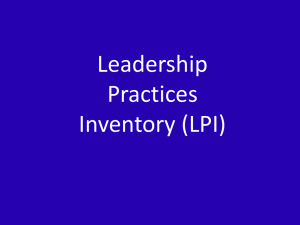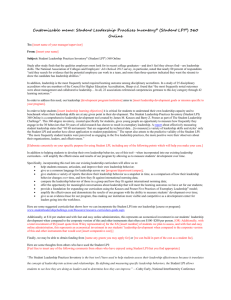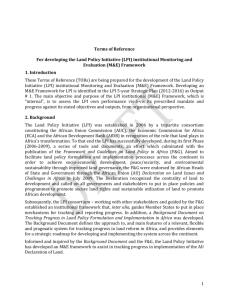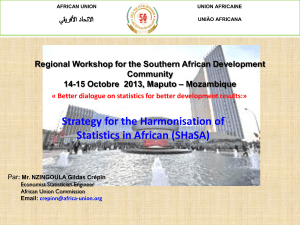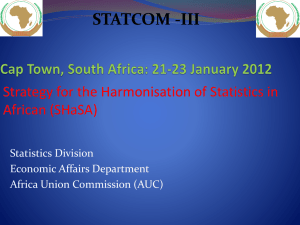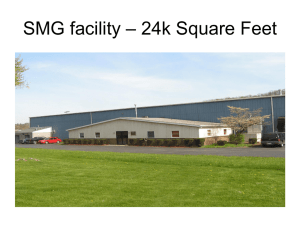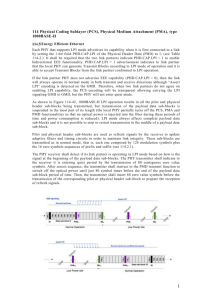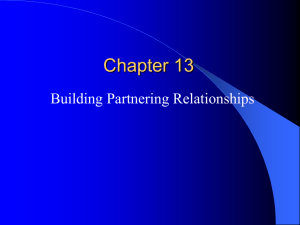Presentation on Supporting Land Policy Development and
advertisement
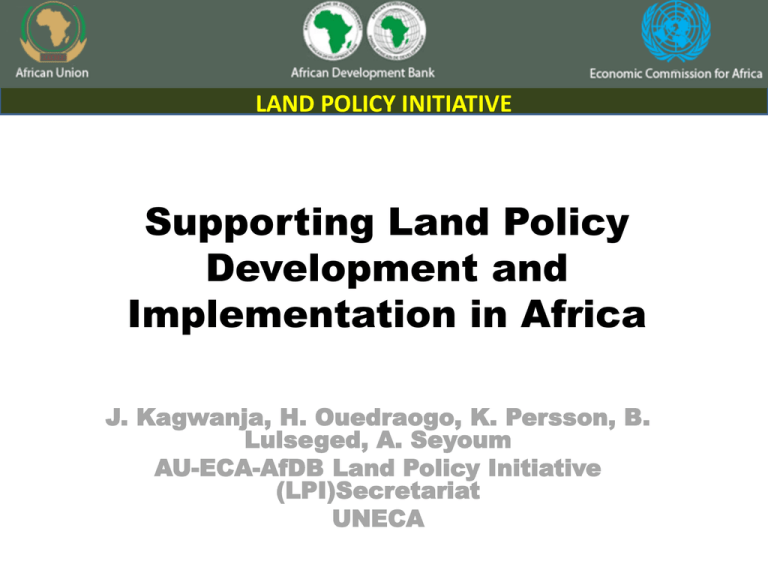
LAND POLICY INITIATIVE Supporting Land Policy Development and Implementation in Africa J. Kagwanja, H. Ouedraogo, K. Persson, B. Lulseged, A. Seyoum AU-ECA-AfDB Land Policy Initiative (LPI)Secretariat UNECA Contents • What is the Land Policy Initiative? What has been achieved • Key Land Issues in Africa • Large Scale Land Based Investments • Draft LPI Strategic Plan: Progress and way forward The Land Policy Initiative (LPI) (Who are we? What have we achieved?) • An African programme on land policy – Initiated jointly by AUC- ECA- AfDB (LPI Consortium) – Collaboration of the RECs – Engagement of key African stakeholders (Governments; Civil society organisations (including Farmers and women); Traditional leaders; African Private sector; – Partnering with- and supported by development partners • Objectives of Phase 1 (2006- 2009) – Build consensus on key issues, lessons learnt and best practices through consultations – Develop Framework and Guidelines on Land Policy (F&G) – Build political will for land policy and implementation – Build partnerships--synergies among devt. Partners towards addressing land challenges in Africa – Mobilise resources The Land Policy Initiative Achievements of phase 1 • Enhanced knowledge of the challenges; gaps in processes/institutions •Regional assessment reports; F&G; • Dialogue/consensus on land policy related agenda to address challenges •Continental/Regional Consultations; Experts/Ministerial meetings; AU Summit • Partnerships and Commitments • Resource Mobilisation/partnerships and synergies •Govts; RECs; CSO (Experts; Ministers; Heads of States) •Devt. partners •Clear understanding by partners of African ownership of the initiative •Building synergy and providing technical and financial support to the initiative… •(IFAD, FAO, Rockefeller Foundation, UNDP, UNHABITAT, World Bank, others) Key Land Issues impeding Food Security and Sustainable Dev • Land issues in agriculture—low investments • Land, environment and climate change • Land and Conflict • Access to land/security of land rights by Women • Land and Regional Integration • Land and urban development • Large Scale Land Based Investments (LSLBI) Large Scale Land Based Investments (LSLBI) Does Africa have abundant agricultural land; where is it? • Africa holds 60% fertile land Others 8% Latin America 31% Africa 61% – non-cultivated & suitable for cropping; non-forested; nonprotected; low population density • But, great diversity on amount of abundant land available Need to identify and map this land—noting current/ planned landuse; ecosystem services; land rights, interests & claims on the land, before embarking on large scale land based investments LSLBIs need to address Africa’s yield gap • Africa can harness (small- and large-scale) domestic and foreign investments on its agricultural land to enhance technology, infrastructure, irrigation, mechanisation, market access and value-adding processing • Reverse neglect of agricultural sector and smallholder producers • LSLBIs models that do not undermine wellbeing of SHolder producers • Progress made in 2003 Maputo Declaration; more support • Seeking partnerships to complement public spending and resources to the sector LSLBIs must protect land rights/ livelihoods of local communities? • Policy frameworks, guidelines & principles to define modalities for access to land by both domestic and foreign investors; recognition and security of land rights for local communities and investors → secure, profitable and equitable LSLBIs • Negotiations: evidence-based, transparent and consultative • optimal land size and land lease period • potential costs/benefits, how they are shared and distributed • Basis and terms of compensation • Provisions for retention of production for local use to tackle food and energy security; • Regulatory mechanisms for environmental enforcement LSLBIs, Environment and climate change concerns • Environmental sustainability and climate change concerns need to be integrated in principles, contractual arrangements (enforceable standards/mechanisms), M&E • What are the ecosystem services (rivers, wetlands, biodiversity, wildlife) that need to be protected, conserved? • How will climate change affect long-term agricultural prospects Data/knowledge gaps LSLBIs need to be part of the solution • Spatial referenced data and analysis are necessary to identify and quantify available land, existing rights, interests and claims of communities and individuals on the land • Continuous data collection to facilitate monitoring of processes and assessment of impacts • Evidence and promising practices for win-win LSLBI models – address dispossession and loss of land rights of communities Africa has committed to improve LSLBI—Nairobi Action Plan • Assessment on LSLBI • Principles and recommendations for fiscal instruments • Capacity Support • M&E on LSLBIs • Improved Policy and regulatory framework Financial resources and partnerships for implementing the Nairobi Action Plan on LSLBIs ADF Consensus statement on harnessing LSLBI in Africa • Fast-track implementation of the AU Declaration on Land Issues to reform policies, laws, admin • Document and map local land use, land rights, interests and claims of land • Optimal land deals with win-win outcomes for local communities, governments and investors • Develop innovative and inclusive LSLBIs models that empower smallholders/protect food security and promote value added processing ADF Consensus statement on harnessing LSLBI in Africa/2 – Strengthen land rights in accordance with the F&G, especially under customary systems – Develop standards and mechanisms for enforcement and monitoring of LSLBIs – Mobilize financial and human resource capacity to implement the Nairobi Action Plan on LSLBI – Enhance the capacities of the LPI to implement the AU Declaration and Nairobi Action Plan LPI Draft 5-year Strategic Plan: Progress, Challenges, way forward A program to implement the AU Declaration and Nairobi Action Plan A strengthened LPI can be transformed into a viable institution for implementing the AU Declaration on Land and the Nairobi Action Plan on LSLBIs applying the F&G, FAO-VG, others Draft LPI Vision, Mission and Goal VISION A peaceful and prosperous Africa realized through equitable access, efficient and sustainable utilization of land MISSION To ensure all land users have equitable access to Land and security of all bundles of land rights, by facilitating effective partnerships, dialogue and capacity building for participatory and consultative land policy formulation and implementation, and efficient and transparent land administration in both customary and statutory jurisdictions GOAL To assist member states in the implementation of the AU Declaration on land issues and challenges in Africa in accordance with the Framework and Guidelines on Land Policy in Africa in order to achieve socio-economic development, peace and security, and environmental sustainability LPI Objectives Promote the implementation of the AU Declaration on Land Issues and Challenges in Africa through: • Advocacy for inclusion of land in the African development agenda, strategies and programmes • • Raising awareness challenges of land related issues and • Building synergies, partnerships and resource mobilization for effective land policy development/implementation/monitoring in Africa capacity development, technical assistance, advisory services • Facilitating knowledge generation, lesson sharing and networking • Promoting • Promoting monitoring and evaluation of land policy development and implementation Draft LPI GOVERNANCE AND ADMINISTRATIVE STRUCTURE Executive Committee Joint Secretariat of the AUC, UNECA, AfDB CHIEF EXECUTIVES JOINT SECRETARIAT SUPPORT OFFICE (JSSO) COORDINATOR, JSSO Chairman African Union Commission (AUC) Executive Secretary Economic Commission for Africa (ECA) President African Development Bank (AfDB) JSSO FOCAL PERSON ON LPI JS WORKING GROUP ON LAND (JS-WGL) DREA, AUC FSSDD, ECA OSAN, AfDB Steering Committee JS-WGL DREA, AUC FSSD, ECA OSAN, AfDB RECs REC- E. Africa REC- C. Africa REC- N. Africa REC- W. Africa REC- S. Africa Others •PAP •PAFFO Observers EU FAO IFAD UNHABITAT LPI Secretariat Technical Advisory Group Prominent Land Policy Experts •Thematic •Regional Representation Chief LPI Lead Lead Land Land Expert Exp ert Lead Land Regional Expert Land Officers Communication Officer Joint Trust Fund AU, AfDB Focal Persons M&E Officer Program Officer Chief PATCO Program Management Officer Program planning/Capacity of LPI • Effective Planning and management of the LPI program – Elements of the 5-year strategic plan; budgets; annual work plan – LPI strategic/Business plan/M&E underway – Regular Steering committees (RECs, PAP, PAPFO) • Increase capacity of the LPI Secretariat – – – – Current 3 professional posts; 2 support staff Secured resources for 4 new posts from EU, ECA 15 consultants recruited for various studies/tasks Delays in recruitment a challenge Mainstreaming Land/Partnerships Mainstreaming land in the agenda for Africa’s development • • Mainstreaming land policy in AUC, ECA, AfDB underway • Mainstreaming land policy/governance in CAADP investment plans--underway • RECs and National Govts—2013++ • Building synergies, partnerships and resource mobilisation • • • • • • MOU with UNHabitat on capacity development MOU with African institutions of learning underway MOU with FAO on application of F&G and VG underway MOU with world bank on e.g. application of LGAF and other tools Resources mobilised - EU, ECA, AUC, UNHabitat, SDC LPI at Partner events (World Bank; IFAD; FAO—CFS; ADF; OECD) FAO- VG on Responsible Governance of Tenure of Land, Fisheries and Forests Aim • Promote food security and sustainable development by improving secure access to land, fisheries and forests and protecting the legitimate tenure rights of millions of people, many of whom are poor and food insecure How LPI is engaging with FAO?: Key areas of joint intervention • Development of VG • Program Development • Support to member States • Awareness raising • Capacity development • Advisory service • Monitoring and Evaluation • Partnerships Knowledge generation/ management • VALPAF (Virtual African Land Policy and Administration Facility)-2012 • LSLBI at ADF (2012) • Study on LSLBI (2012) • Study on Women’s Land rights (2012) • Journal (online) on land policy in Africa (2014) • Bi-annual Conference on land Policy in Africa (2014) Communication & Advocacy for land governance/policy • Communication and advocacy strategy (2013)—HR constraints • Communication/advo cacy tools (20012++ Capacity/Skills development and training • Background Document on Capacity Development (2012) • Capacity development framework, training programs (2012) • Curriculum on land policy and land management (2013) • Action research (2013++) • Technical and Advisory Services (2008++) Monitoring and Evaluation • Background Document on tracking progress on land policy (2011/2) • Framework for M&E (2013) • Pilots (2013++) • Report to the AU summit (2013++) Thank you, Merci!!!
